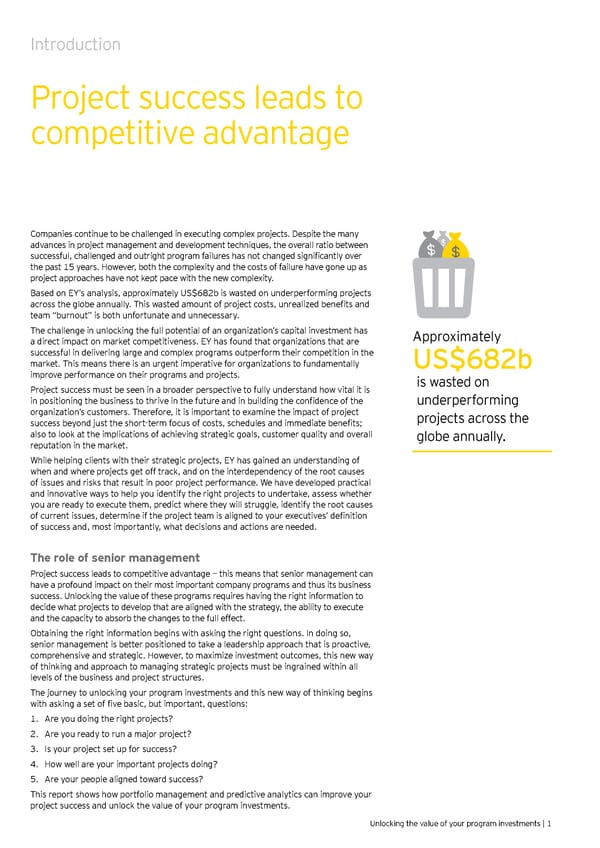Introduction Project success leads to competitive advantage Companies continue to be challenged in executing complex projects. Despite the many advances in project management and development techniques, the overall ratio between successful, challenged and outright program failures has not changed significantly over the past 15 years. However, both the complexity and the costs of failure have gone up as project approaches have not kept pace with the new complexity. Based on EY’s analysis, approximately US$682b is wasted on underperforming projects across the globe annually. This wasted amount of project costs, unrealized benefits and team “burnout” is both unfortunate and unnecessary. The challenge in unlocking the full potential of an organization’s capital investment has Approximately a direct impact on market competitiveness. EY has found that organizations that are successful in delivering large and complex programs outperform their competition in the market. This means there is an urgent imperative for organizations to fundamentally US$682b improve performance on their programs and projects. is wasted on Project success must be seen in a broader perspective to fully understand how vital it is in positioning the business to thrive in the future and in building the confidence of the underperforming organization’s customers. Therefore, it is important to examine the impact of project projects across the success beyond just the short-term focus of costs, schedules and immediate benefits; also to look at the implications of achieving strategic goals, customer quality and overall globe annually. reputation in the market. While helping clients with their strategic projects, EY has gained an understanding of when and where projects get off track, and on the interdependency of the root causes of issues and risks that result in poor project performance. We have developed practical and innovative ways to help you identify the right projects to undertake, assess whether you are ready to execute them, predict where they will struggle, identify the root causes of current issues, determine if the project team is aligned to your executives’ definition of success and, most importantly, what decisions and actions are needed. The role of senior management Project success leads to competitive advantage — this means that senior management can have a profound impact on their most important company programs and thus its business success. Unlocking the value of these programs requires having the right information to decide what projects to develop that are aligned with the strategy, the ability to execute and the capacity to absorb the changes to the full effect. Obtaining the right information begins with asking the right questions. In doing so, senior management is better positioned to take a leadership approach that is proactive, comprehensive and strategic. However, to maximize investment outcomes, this new way of thinking and approach to managing strategic projects must be ingrained within all levels of the business and project structures. The journey to unlocking your program investments and this new way of thinking begins with asking a set of five basic, but important, questions: 1. Are you doing the right projects? 2. Are you ready to run a major project? 3. Is your project set up for success? 4. How well are your important projects doing? 5. Are your people aligned toward success? This report shows how portfolio management and predictive analytics can improve your project success and unlock the value of your program investments. Unlocking the value of your program investments | 1
 Unlocking the Value of your Program Investments Page 2 Page 4
Unlocking the Value of your Program Investments Page 2 Page 4